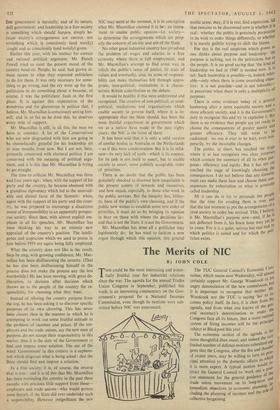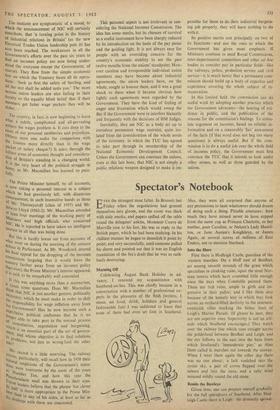The Merits of NIC
By JOHN COLE
rrtits could be the most interesting and poten- t tially fruitful year for industrial relations since the war. The agenda for the annual Trades Union Congress in September, published this week, is an interesting commentary on the Gov- ernment's proposal for a National Incomes Commission, even though its motions were sub- mitted before NIC was announced. The TUC General Council's Economic Com- mittee, which meets next Wednesday, will almost certainly support Mr. George Woodcock in his angry denunciation of the new commission, but it is important to recognise that neither Mr' Woodcock nor the TUC is saying 'no' to r comes policy itself, In fact, it is clear from tne agenda, and from what one knows of the gen- eral secretary's determination to make the Congress face all its fences, that a more raticalal , system of fixing incomes will be the principal subject at Blackpool this year. The economic section of the agenda is far more thoughtful than usual, and indeed the vet.' limited number of defence motions submitted sug; gests that the Congress, after the fire and tburlde of recent years, may be willing to turn its PI: cipal attention to the domestic affairs in whte.. it is more expert. A typical motion would in struct the General Council to 'work out a f °the tive statement for the general guidance 01 '..‘d trade union movement on its long-term an.o, immediate objectives in economic planning, of eluding the planning of incomes and the role collective bargaining.' The motions are symptomatic of a mood, to Which the announcement of NIC will certainly contribute, that `a turning point in the history of industrial relations in Britain' (as the new electrical Trades Union leadership puts it) has now been reached. The weaknesses in all the Government's efforts over the past six years to find an incomes policy are now being under- stood (by everyone except the Government, of C°UrSe). They flow from the simple economic text on which the Treasury bases all its opera- tions: 'Seek ye first the safety of Sterling, and all the rest shall be added unto you.' The more serious union leaders are also failing in their loyalty to the equally blind belief that if their members get fatter wage packets they will be richer.
The country, in fact, is now beginning to learn "at a subtle, complicated and all-pervading subject the wages problem is. It cuts deep to the roots of our personal snobberies and prejudices. tWhere must one make the comparison with the Joneses more directly than in the wage ,Packet or salary cheque?) It soars through the loftiest areas of economic thought and considera- pt)1.1 of Britain's standing in a changing world. ho ye, the very heart of the political struggle at me, as Mr. Macmillan has learned so pain- The Prime Minister himself, by all accounts, now taking a personal interest in a subject which he had previously left, with disastrous consequences, in such insensitive hands as those Selwyn Mr. Thorneycroft (class of 1957) and Mr. 'clwYn Lloyd (1961-2). Mr. Macmillan attended at least four meetings of the working party of Ministers and high officials who conceived 1'11C. He is reported to have taken an intelligent interest in all that was being done. But this is hardly borne out from accounts of ghat went on during the morning of the censure bdebate in Parliament. As Mr. Woodcock uttered I511a1 appeal for the dropping of the incomes cftimission (arguing that it would leave the Country farther away from an incomes policy than ever), the Prime Minister's interest appeared, it Is said, to be remarkably well concealed. It this was anything more than a mannerism, it think some questions. Does Mr. Macmillan ink that NIC is just another gesture, politically necessary, which he must make in order to shift e responsibility for wage inflation away from stt's Government? Has he now become such a ecrlative political craftsman that he is no
of
tiger able to take part in the normal process much consultation, negotiation and bargaining, ich Is an essential part of the art of govern- toeht. and whose objective is to find solutions Problems, not just to wrong-foot the other side?
is record is a little worrying. The railway 11,t1 particularly, will recall how in 1958. their lions suspicions of the Government's inten- al,"s were overcome by the scent of the roses Number Ten, and how this year the ti-sschendaele mud was thrown in their eyes. b:111,1'11 leaders believe that the phrase 'too clever Min- ister is more appropriate to the Prime Min- raithan to any of his aides, at least as far as mealings with them are concerned. This personal aspect is not irrelevant in con- sidering the National Incomes Commission. The idea has some merits, but its chances of survival as a useful instrument have been sharply reduced by its introduction on the heels of the pay pause and the guiding light. It is not always easy for people with an overriding concern for the country's economic stability to see the past twelve months from the unions' standpoint. How- ever careless and irresponsible individual union members may have become about industrial agreements, the union leaders have, on the whole, sought to honour them, and it was a great shock to them when it became obvious how lightly such agreements were regarded by the Government. They have the kind of feeling of anger and frustration which would sweep the Bar if the Government were to interfere blatantly and frequently with the decisions of HM Judges.
Inevitably, they see NIC as a body set up to introduce permanent wage restraint, quite iso- lated from the consideration of the whole needs of the economy, in which the TUC has agreed to take part through its membership of the National Economic Development Council. Unless the Government can convince the unions, even at this late hour, that NIC is not simply a public relations weapon designed to make it im-
possible for them to do their industrial bargain- ing job properly, they will have nothing to do with it.
Its positive merits rest principally on two of its functions—and not the ones to which the Government has given most emphasis. If Ministers continue to need Royal Commissions, inter-departmental committees and ether ad hoc bodies to consider pay in particular fields—like the railways, police, probation service and civil service—it is much better that a permanent com- mission should build up a body of expertise and experience covering the whole subject of re- muneration.
In this limited field, the commission can do useful work by adopting another practice which the Government advocates--the hearing of evi- dence in public, and the publication of the reasons for the commission's findings To stimu- late argument on incomes, based on reliable in- formation and on a reasonably `fair assessment of the facts (if that word does not beg too many questions) is always useful. But if the com- mission is to do a useful job over the whole field of incomes policy, the Government must first convince the TUC that it intends to look under other stones, as well as those guarded by the unions.































 Previous page
Previous page